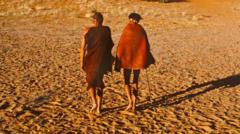Authorities reported that Brook lured 34 children with sweets and cash, leading to shocking findings of explicit photographs on his confiscated camera. The case has drawn significant concern over the exploitation of indigenous communities' cultural integrity.
The case highlights the need for vigilance against the exploitation of vulnerable populations in tourism.
A British national has been arrested in Namibia for allegedly sexually molesting minors and taking nude photographs of them. Douglas Robert Brook, 65, is accused of touching the private parts of children from the indigenous San community in central Namibia while on holiday. He faces 38 charges, including rape, indecent assault, and child exploitation, as reported by local media.
Brook reportedly lured 34 young children with sweets and money, which allowed him to take their photographs in vulnerable positions. The street where the incidents occurred is located in the Otjozondjupa region, which is known for its cultural richness and indigenous populations. Police confirmed that he sexually abused 16 teenage girls and 14 boys, and some nude photographs were discovered on his camera after his arrest.
He appeared in court in Grootfontein, north of the capital Windhoek, where he was denied bail and remanded in custody. The case has been rescheduled to next month to allow state prosecutors time for further investigations. Namibian Information Minister Emma Theofelus confirmed that the tourist will remain in police custody during this time.
In response to the incident, the Namibian Ministry of Environment and Tourism expressed outrage, labeling the actions as “deeply disrespectful” to the cultural heritage of the San community. They emphasized that exploiting or objectifying indigenous communities for any purpose, including photography, is unacceptable. The British embassy in Namibia has stated that they possess no further information beyond media reports.
While Namibia is known for its stunning landscapes and rich cultural experiences, this incident serves as a stark reminder of the need for responsible tourism and safeguarding vulnerable communities from exploitation.
The case highlights the need for vigilance against the exploitation of vulnerable populations in tourism.
A British national has been arrested in Namibia for allegedly sexually molesting minors and taking nude photographs of them. Douglas Robert Brook, 65, is accused of touching the private parts of children from the indigenous San community in central Namibia while on holiday. He faces 38 charges, including rape, indecent assault, and child exploitation, as reported by local media.
Brook reportedly lured 34 young children with sweets and money, which allowed him to take their photographs in vulnerable positions. The street where the incidents occurred is located in the Otjozondjupa region, which is known for its cultural richness and indigenous populations. Police confirmed that he sexually abused 16 teenage girls and 14 boys, and some nude photographs were discovered on his camera after his arrest.
He appeared in court in Grootfontein, north of the capital Windhoek, where he was denied bail and remanded in custody. The case has been rescheduled to next month to allow state prosecutors time for further investigations. Namibian Information Minister Emma Theofelus confirmed that the tourist will remain in police custody during this time.
In response to the incident, the Namibian Ministry of Environment and Tourism expressed outrage, labeling the actions as “deeply disrespectful” to the cultural heritage of the San community. They emphasized that exploiting or objectifying indigenous communities for any purpose, including photography, is unacceptable. The British embassy in Namibia has stated that they possess no further information beyond media reports.
While Namibia is known for its stunning landscapes and rich cultural experiences, this incident serves as a stark reminder of the need for responsible tourism and safeguarding vulnerable communities from exploitation.



















